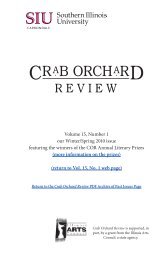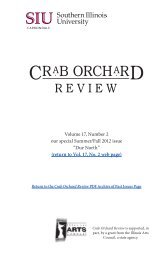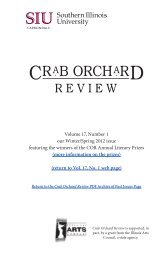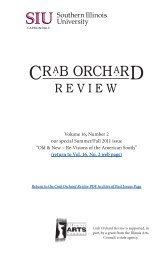Crab Orchard Review Vol. 12, No. 2, our
Crab Orchard Review Vol. 12, No. 2, our
Crab Orchard Review Vol. 12, No. 2, our
You also want an ePaper? Increase the reach of your titles
YUMPU automatically turns print PDFs into web optimized ePapers that Google loves.
220 ◆ <strong>Crab</strong> <strong>Orchard</strong> <strong>Review</strong><br />
Book <strong>Review</strong>s<br />
their lives. In the final line of the opening story, “<strong>No</strong>t People, <strong>No</strong>t This,”<br />
she writes about the way people “understand more about each other<br />
than, maybe, we ever want to admit,” which may well serve as a thesis<br />
for her entire collection. More often than not, Kelly Magee’s stories live<br />
up to the promise of that thesis.<br />
—<strong>Review</strong>ed by Shanie Latham<br />
Francis, Vievee, Blue-Tail Fly. Detroit, MI: Wayne State University<br />
Press, 2006, 77 pages, $14.95.<br />
In her first collection of poetry, Blue-Tail Fly, Vievee Francis takes her<br />
readers on a j<strong>our</strong>ney down cobbled roads and dirt paths of the past,<br />
successfully transporting us to the days from slavery to manumission<br />
and the immense hardships of the Civil War era. She breathes life into<br />
what are often thought of as simpler yet conflicted times, resurrecting<br />
the authenticity of attitudes and language which echo through to the<br />
present. Her choir of voices captures personas from slave to politician,<br />
soldier to mother, none of whom were left untouched by the volatile<br />
events of the day.<br />
Francis presents arguments and motivations from both sides of<br />
war. She details pro-war sentiments in “Ample Cause of War,” written<br />
from the point of view of President Polk, and “General Taylor Convinces<br />
Himself That He Is For War.” <strong>No</strong>n-violent desires are expressed in a<br />
plea for protests against atrocities in “Fredrick Douglass Speaks before<br />
the Anti-Mexican War Abolitionists.”<br />
One of the most compelling works is “The Binding Tie,” a series of<br />
seven sonnets inspired by stories told to the author by her grandmother<br />
depicting actual recollections of her great-great-grandmother, an exslave<br />
who illegally married an Irishman. The couple fled Mississippi<br />
for the forests of eastern Texas, and the poems are a call and response<br />
between Callie’s point of view and Andrew’s. The following lines<br />
explore a sense of Callie’s newfound freedom within her relationship<br />
to Andrew, illustrating a stark contrast between forced possession of a<br />
woman in bondage to the willing posssession of a wife in love:<br />
I’m free—I’m his. We find <strong>our</strong>selves rolled up<br />
like good corn biscuits come daybreak.<br />
He smells sweet and s<strong>our</strong> as buttermilk—<br />
a scent my woolen plaits seem made to sop.






